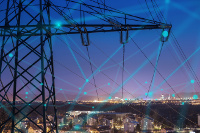What stabilises the power grid on days with low electricity generation when large numbers of customers want to charge up an electric vehicle? How can the grid be maintained in the event of storage system outages? What happens when key measurement and control systems are disrupted? How can the grid be protected from hacker attacks? Answers to these questions are being researched by Smart Grid LAB Hessen, initiated by House of Energy, together with its partners, including Tractebel.
The realistic laboratory is being set up in R
International expert knowledge required
The purpose of the Smart Grid LAB is to test active control processes in the smart grid and all required functionalities under real-world conditions. To this end, joint work is being carried out by experts from the fields of research, engineering, IT security and the manufacture of electrical switching and measurement components in the Germany state of Hessen.
The interdisciplinary team is examining the smart grid from different perspectives. All sources of energy and consumer behaviours are simulations of real-world examples, enabling challenging grid situations to be simulated without risk.
The experts from Tractebel will be contributing their experience from international energy infrastructure projects. They will ensure that the results of the Smart Grid LAB Hessen research are capable of being transferred to national and international grid scenarios.
Future scenarios with renewable energy
In the Smart Grid Lab, Tractebel experts are addressing questions of global relevance: How can stable network quality be maintained with increasing shares of renewable energy, electromobility and decentralised feed-in? The task is to define future scenarios which can be used in the laboratory to test and verify potential technical solutions.
Based on the knowledge gained, Tractebel will create feasible smart grid designs and concepts, which are then to be analysed in terms of technical, economic and regulatory perspectives. In addition, the experts also consider global development projects running in parallel and incorporate new findings in the project. In summary, they will provide recommendations for action with regards to regulation, legislation, economic optimisation, network and generation technology. Through publications and specialist lectures the knowledge gained will be disseminated for further use.
